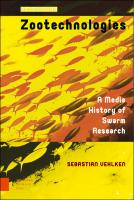Zootechnologies
A Media History of Swarm Research
Abstract
Swarming has become a fundamental cultural technique related to dynamic processes and an effective metaphor for the collaborative efforts of society. This book examines the media history of swarm research and its significance to current socio-technological processes. It shows that the hype about collective intelligence is based on a reciprocal computerization of biology and biologization of computer science: After decades of painstaking biological observations in the ocean, experiments in aquariums, and mathematical model-making, it was swarms-inspired computer simulation which provided biological researchers with enduring knowledge about animal collectives. At the same time, a turn to biological principles of self-organization made it possible to adapt to unclearly delineated sets of problems and clarify the operation of opaque systems - from logistics to architecture, or from crowd control to robot collectives. As zootechnologies, swarms offer performative, synthetic, and approximate solutions in cases where analytical approaches are doomed to fail.
Keywords
Media History, Media Theory Swarm Intelligence, Computer Simulation, Animal CollectivesISBN
9789048537426, 9789048537426Publisher
Amsterdam University PressPublisher website
https://www.aup.nl/Publication date and place
2019Imprint
Amsterdam University PressSeries
Recursions,Classification
Media studies
History of engineering and technology


 Download
Download Web Shop
Web Shop